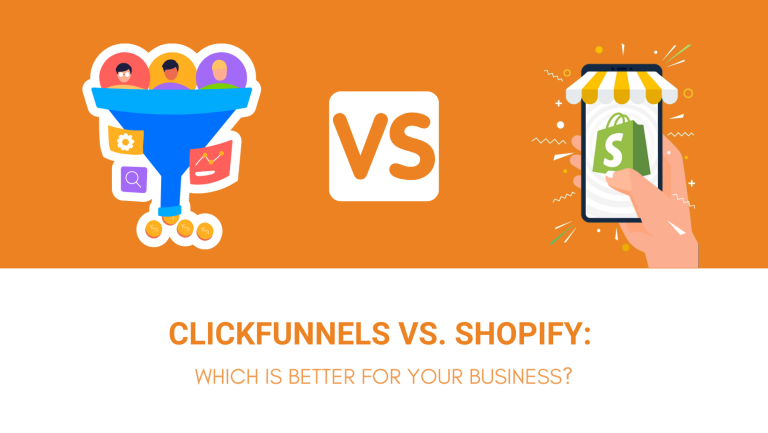ClickFunnels and Shopify are two of the most popular platforms on the internet. Entrepreneurs have maximized these both to succeed in their chosen industries.
However, many wonder which of these two is better for business.
In this article, we’ll run down everything you need to know about ClickFunnels and Shopify. That includes an overview, key features, pros and cons, main differences, and pricing plans.
If you’re unsure of which application to use for your business, definitely read up on our recommendation below. We’ll even include answers to common questions on the internet.
Let’s dive into it.
ClickFunnels vs. Shopify: Overview
Before we dive into a detailed comparison, let’s set the stage by understanding what ClickFunnels and Shopify are designed for.
Both tools cater to different aspects of online business, so knowing their primary purposes is important to making the right choice for your needs.
What Is ClickFunnels?
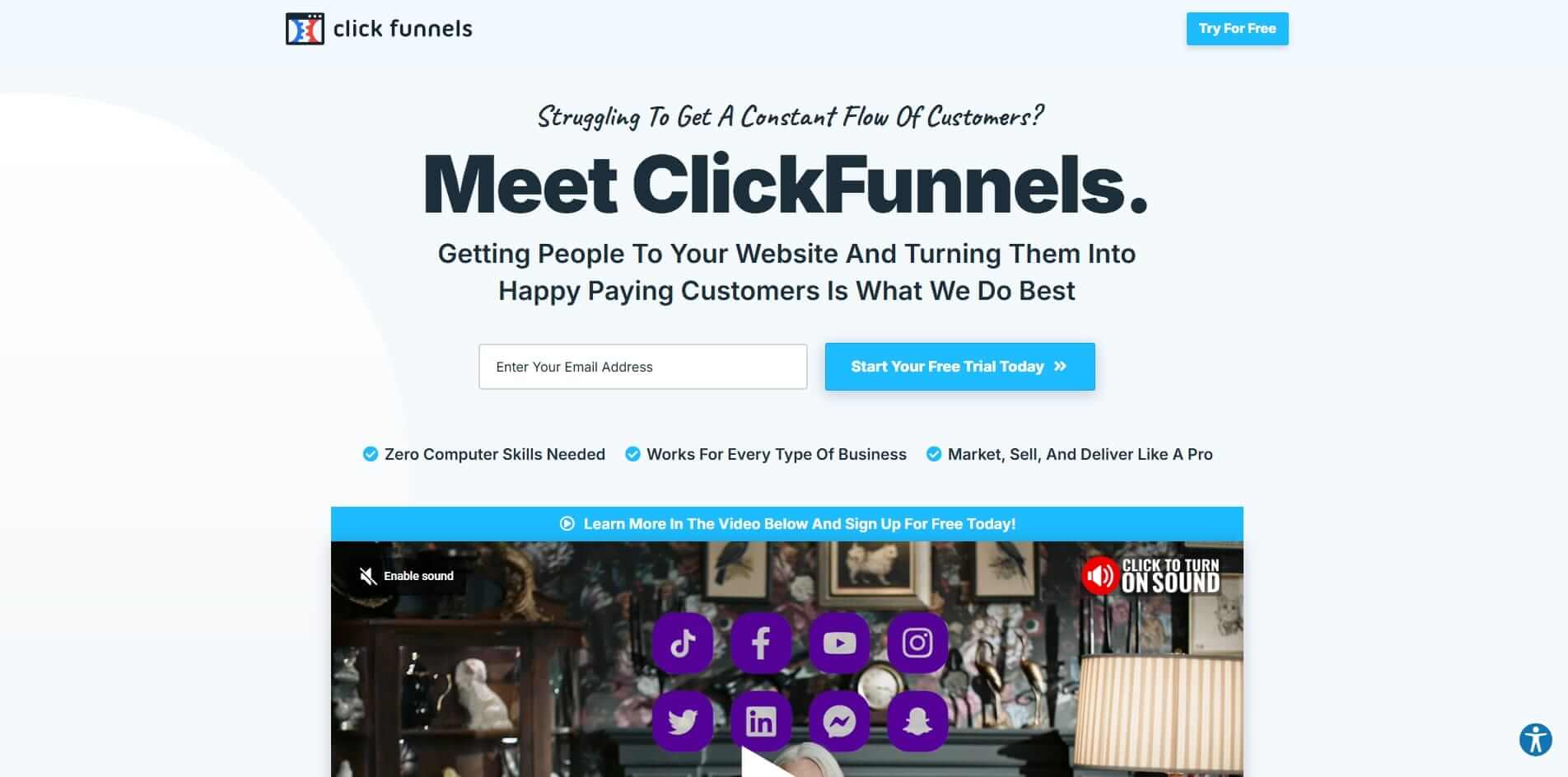
ClickFunnels is a powerful online tool designed to help businesses create, launch, and manage sales funnels effectively.
For those unfamiliar, a ‘sales funnel’ refers to the step-by-step journey potential customers take—from discovering your product or service to completing a purchase.
The core goal of ClickFunnels is to simplify this process by providing all the tools you need in one place.
Whether it’s lead generation, email marketing, upselling, or hosting webinars, ClickFunnels equips entrepreneurs with features tailored to streamline marketing efforts.
Key highlights include:
- Pre-designed Funnel Templates: Save time by choosing from a wide variety of templates for different goals, such as lead generation or sales.
- Drag-and-Drop Builder: Create visually appealing pages without needing technical skills.
- Integrated Tools: Includes email automation, A/B testing, and payment gateways.
ClickFunnels is particularly popular among marketers and solopreneurs looking to focus on high-conversion strategies rather than setting up a full-scale eCommerce store.
What Is Shopify?
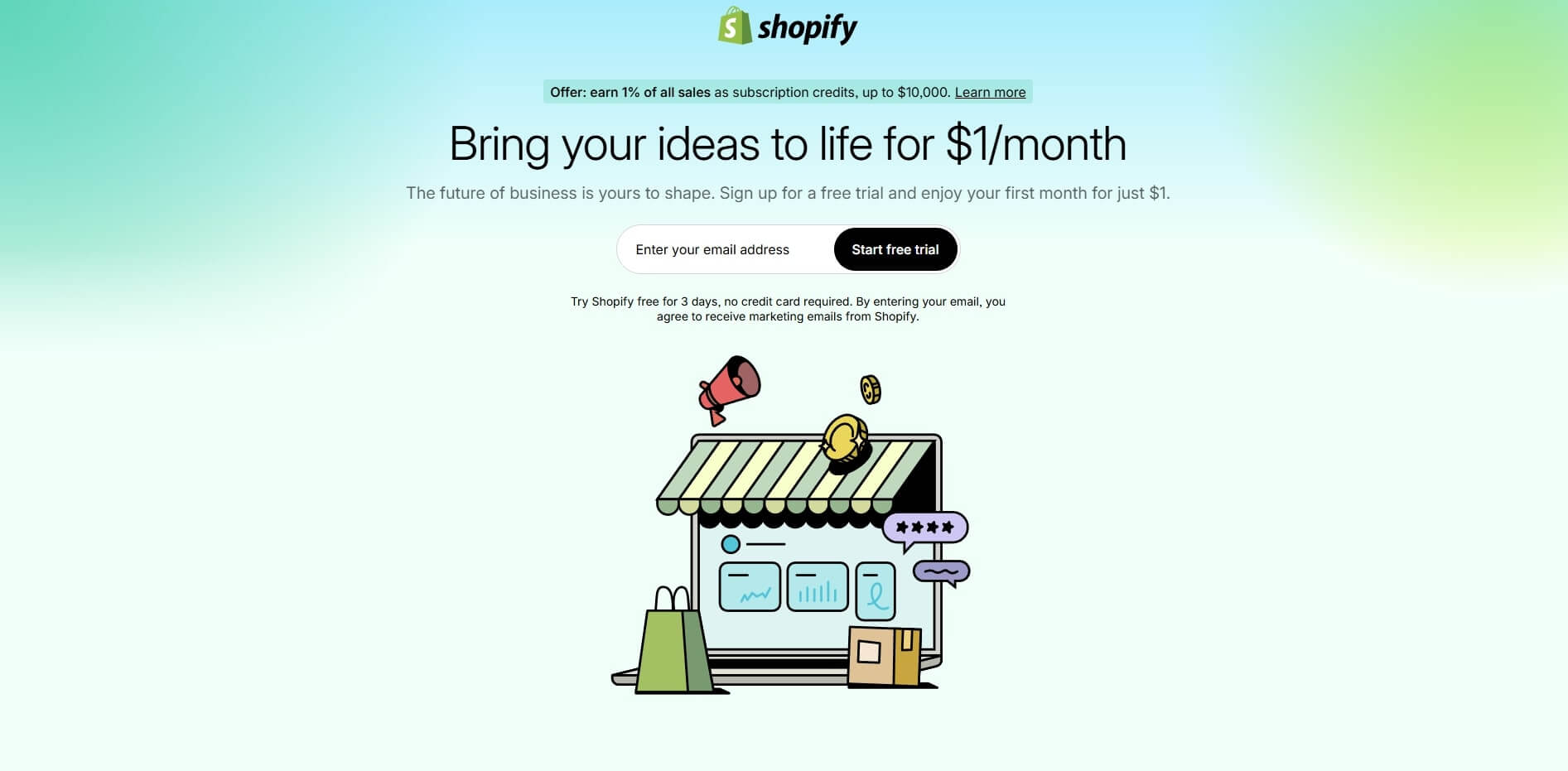
Shopify, in contrast, is a comprehensive eCommerce platform that allows users to set up and manage online stores. It’s ideal for anyone looking to sell products or services online, whether it’s through dropshipping, print-on-demand, or traditional retail.
This subscription-based solution offers tools to handle every aspect of running an online business—from product listing and payment processing to inventory management and order fulfillment. Shopify is also equipped with Point-of-Sale (POS) features for businesses with physical stores.
Key features of Shopify include:
- Customizable Online Storefronts: Choose from professional themes to build your brand’s presence.
- Integrated Payment Solutions: Accept payments seamlessly through Shopify Payments or third-party gateways.
- Multi-Channel Selling: Expand your reach by selling directly on social media, marketplaces, and more.
Shopify stands out as a central hub for growing businesses, offering scalability and flexibility for entrepreneurs at every stage.
ClickFunnels vs. Shopify: Features Comparison
When choosing between ClickFunnels and Shopify, understanding their core features is key to determining which platform aligns better with your business goals.
In this section, we’ll break down the features of each platform and compare how they meet various business requirements.
Whether you’re planning to sell through funnels or build a comprehensive store, this comparison will help clarify your options.
Ease of Use
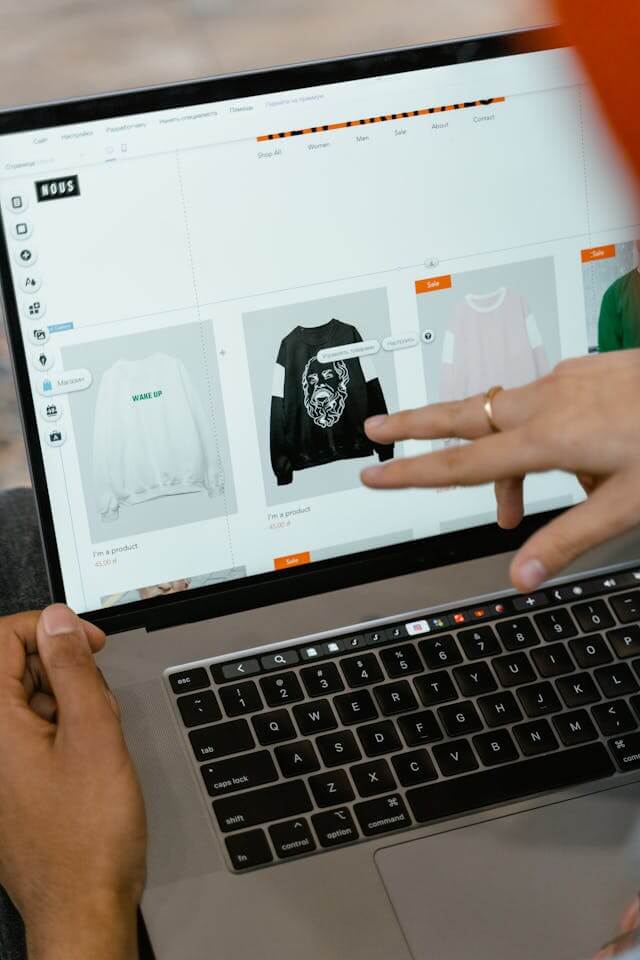
When deciding on a platform, the ease of use is crucial, especially for entrepreneurs new to online business or those with limited technical expertise. Both ClickFunnels and Shopify offer user-friendly interfaces, but they excel in different areas based on your business goals.
ClickFunnels is built with simplicity in mind, especially for creating high-converting sales funnels. The drag-and-drop editor is intuitive, making it easy to design pages without any coding skills.
Setting up a funnel takes just a few clicks, and the pre-built templates help guide you through the process. However, while it’s streamlined for funnels, it can be a bit more complex if you’re looking to create a full-fledged eCommerce store or need customization beyond the funnel structure.
Shopify, on the other hand, is renowned for its easy-to-use online store builder. The setup process is straightforward, allowing users to quickly add products, customize their storefront, and start selling.
The user interface is clean, and the drag-and-drop functionality makes it easy for beginners. However, Shopify’s learning curve can be steeper for those who want to fully customize their store or integrate advanced features.
Verdict: ClickFunnels is a go-to choice for users who want to set up targeted sales funnels with minimal effort, while Shopify shines for creating and managing online stores. If you’re aiming to run a comprehensive eCommerce business with a focus on sales and marketing, Shopify’s ease of use might be the better fit.
Customization Options
When it comes to customization, both ClickFunnels and Shopify offer flexibility, but they cater to different needs and use cases.
ClickFunnels focuses primarily on building optimized sales funnels, and it offers the following customization features:
- The drag-and-drop editor makes it easy to adjust landing pages, upsell pages, and thank-you pages without coding.
- You can start with pre-built templates and modify them to match your brand, tweaking colors, fonts, and page elements.
- Customization becomes more limited when it comes to building a traditional eCommerce store, as ClickFunnels is designed to optimize sales funnels, not full online stores.
- For advanced customizations (like third-party tool integrations or backend adjustments), some technical knowledge is required.
Shopify offers a broader range of customization options for full online stores:
- You can choose from a wide variety of themes, both free and paid, with each being fully customizable.
- The theme editor enables easy adjustments to fonts, layouts, and visual elements without any coding knowledge.
- For advanced customizations, you’ll need to use Shopify’s Liquid language or rely on third-party apps.
- Shopify’s App Store provides numerous apps to extend functionality for marketing, inventory, and other store features.
Verdict: Shopify provides more options for users looking to build a fully customizable online store, including advanced coding capabilities and third-party apps. ClickFunnels, on the other hand, is better suited for users looking to create optimized sales funnels with ease, though it doesn’t offer the same level of flexibility for broader eCommerce needs.
Sales Funnel Building
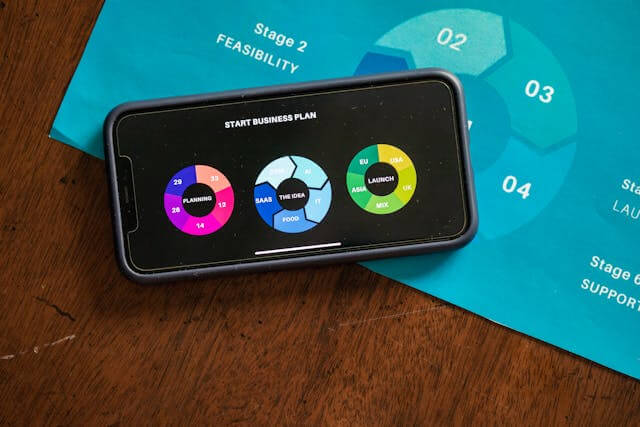
ClickFunnels is renowned for its intuitive Sales Funnel Builder, which is specifically designed to guide potential customers through the buying process and maximize conversions. With ClickFunnels, you can:
- Drag-and-Drop Simplicity: Build and customize funnels without any coding knowledge.
- Ready-to-Use Templates: Choose from a wide variety of funnel templates tailored for lead generation, product sales, or webinars.
- A/B Testing: Optimize every step of your funnel by testing different page variations.
This feature is the heart of ClickFunnels, making it a top choice for businesses focused on targeted marketing campaigns and direct sales strategies.
In comparison, Shopify doesn’t include a dedicated sales funnel builder as part of its core offering. While it excels in building and managing online stores, it lacks the specialized tools needed to create complex sales funnels.
That said, you can integrate third-party apps like Funnelish or Zipify Pages to add funnel-like functionality, but this involves additional costs and setup.
Verdict: If creating sales funnels is central to your business strategy, ClickFunnels provides a purpose-built solution that outshines Shopify in this area. Shopify may still be a viable option if your primary focus is running an eCommerce store and funnel features are not a priority.
Product Management

ClickFunnels is primarily focused on building and optimizing sales funnels, rather than managing large product catalogs.
It does allow you to add physical and digital products within your funnels, but its product management features are quite basic. You can create order forms that include upsell and downsell options, allowing for multiple products within a sales funnel.
However, when it comes to managing inventories, tracking stock, or handling large numbers of products, ClickFunnels falls short compared to full-fledged eCommerce platforms.
Shopify excels in product management, offering a comprehensive suite of tools for running an online store:
- Unlimited Products: Add as many products as you need and organize them by collections, categories, or tags.
- Inventory Tracking: Easily track stock levels, set low-stock alerts, and manage product variants like size and color.
- Bulk Uploads: Upload large numbers of products via CSV files to save time.
- Advanced Customization: Adjust product pages, enable product reviews, and offer dynamic pricing and other advanced features.
Verdict: ClickFunnels is ideal for businesses that need simple product management within sales funnels. Shopify, however, is a better choice for companies with larger product catalogs, offering powerful tools for inventory management and product customization.
Payment Processing and Checkout

ClickFunnels integrates payment processing directly within its sales funnel system, focusing on simplicity and conversion.
It supports a variety of payment processors like Stripe and PayPal, making it easy to set up payment gateways for both digital and physical products.
Additionally, ClickFunnels allows for advanced sales features like one-click upsells and order bumps, which are designed to increase average order value and simplify the checkout process.
However, since ClickFunnels isn’t built for traditional eCommerce stores, it lacks a native shopping cart and checkout system, limiting customization options for the checkout experience.
Shopify, however, is a dedicated eCommerce platform with a robust and customizable payment system. Shopify supports numerous payment gateways, including its own Shopify Payments, PayPal, and Stripe, allowing for seamless local and international transactions.
The platform’s checkout process is highly customizable, offering options such as discount codes, multiple shipping methods, and guest checkout. Shopify also includes an abandoned cart recovery feature, which automatically sends emails to customers who leave the site before completing their purchase, helping to recover lost sales.
Verdict: ClickFunnels provides a straightforward payment system ideal for sales funnels but lacks the flexibility of Shopify’s comprehensive checkout process. For businesses looking for advanced payment processing and a fully customizable checkout, Shopify is the clear winner.
Marketing and SEO Tools

ClickFunnels offers a variety of marketing tools designed to drive traffic and optimize conversions within sales funnels. The platform includes built-in email marketing automation, allowing you to create drip campaigns and nurture leads through targeted messages.
Additionally, ClickFunnels provides affiliate management tools, making it easy to set up and manage an affiliate program.
While it has some basic SEO functionality, such as the ability to edit page titles, descriptions, and meta tags, its SEO capabilities are limited compared to a platform designed specifically for eCommerce.
For more advanced SEO features or strategies, you would likely need to integrate third-party apps.
Shopify shines when it comes to SEO tools and marketing features. The platform includes a wide range of built-in tools to help optimize your store for search engines, including:
- Customizable meta tags for pages and products.
- Alt text for images to improve image SEO.
- Automatic sitemap generation to help search engines index your site.
- Integration with advanced SEO apps like SEO Booster and Plug in SEO for more in-depth optimization.
Beyond SEO, Shopify offers a comprehensive set of marketing tools, such as:
- Email marketing with built-in campaigns and automation.
- The ability to create and manage discount codes for promotions.
- Integration with social media platforms like Facebook, Instagram, and Twitter.
- Support for Google Ads and Facebook Ads to easily run paid marketing campaigns.
- Powerful tools for creating customer segments for targeted marketing.
Verdict: While ClickFunnels offers essential marketing tools, its SEO and marketing capabilities are more basic and often require third-party integrations. Shopify, with its extensive SEO features and wide array of marketing tools, is better suited for businesses looking for a robust, all-in-one solution for both SEO and marketing.
Third-Party Integrations
ClickFunnels offers a wide variety of integrations with third-party tools, especially those aimed at enhancing the marketing and sales process. You can easily connect ClickFunnels with popular tools such as email marketing services (e.g., AWeber, Mailchimp), payment processors (e.g., Stripe, PayPal), and CRM systems (e.g., HubSpot).
Additionally, ClickFunnels integrates well with Zapier, enabling you to connect to thousands of other apps and automate workflows.
However, ClickFunnels doesn’t offer as many native integrations with eCommerce-focused apps, which may be a limitation if you’re trying to scale a larger online store with specialized needs.
Shopify, being a comprehensive eCommerce platform, offers extensive integration options with thousands of third-party apps and tools.
You can integrate your Shopify store with a wide range of services across marketing, sales, shipping, inventory management, customer service, and more. Some key integrations include:
- Payment processors like PayPal, Stripe, and Shopify Payments for seamless transactions.
- Shipping and fulfillment services such as ShipStation and EasyShip for dropshipping.
- Marketing platforms like Mailchimp, Klaviyo, and Google Ads.
- CRM systems like Salesforce and HubSpot.
- Various analytics tools like Google Analytics and Facebook Pixel for tracking and optimizing performance.
Verdict: ClickFunnels excels in integrating marketing and sales tools but lacks the eCommerce-specific integrations that Shopify provides. For businesses needing a broad range of eCommerce and marketing integrations, Shopify is the better choice, offering a more robust ecosystem of apps and tools.
Dropshipping
ClickFunnels isn’t specifically designed for dropshipping, but it can support dropshipping businesses through integrations with third-party apps.
While ClickFunnels excels at creating highly optimized sales funnels for lead generation and sales, its core features don’t focus on product management, order fulfillment, or inventory tracking. All of these are crucial for a dropshipping business.
However, you can integrate ClickFunnels with Shopify to manage your dropshipping processes. This adds complexity to the workflow but can be useful for marketing-oriented dropshipping stores.
If we talk about Shopify it is one of the best platforms for dropshipping. With easy integrations to apps like DSers and Spocket, Shopify enables seamless product sourcing and order fulfillment directly from suppliers.
Shopify’s dropshipping tools and apps allow you to find suppliers, add products to your store, and automatically manage orders without the need for upfront inventory.
It also offers built-in features such as automated tax calculation, shipping options, and payment processing, all of which simplify the dropshipping process. Shopify is a go-to choice for entrepreneurs looking to start a dropshipping business with minimal upfront costs.
Verdict: While ClickFunnels can be adapted for dropshipping through integrations, Shopify offers a more comprehensive and dedicated solution. If dropshipping is your main business model, Shopify’s built-in features and third-party integrations make it the clear winner for managing and scaling a dropshipping business.
Pricing and Value

ClickFunnels offers two primary pricing plans:
- Startup Plan: $97 per month (or $81 per month when billed annually). This plan includes 3 brand workspaces, 3 team members, and unlimited funnels, courses, members, contacts, pages, and domains.
- Pro Plan: $297 per month (or $248 per month when billed annually). This plan includes 10 brand workspaces, 10 team members, and all the same features as the Startup Plan.
Shopify offers a range of pricing tiers suitable for different business needs:
- Basic Shopify: $19 per month (billed annually). This plan includes 10 inventory locations, 24/7 chat support, localized global selling (in 3 markets), and POS Lite. Card rates start at 2% for third-party payment providers.
- Shopify: $49 per month (billed annually). This plan offers 5 additional staff accounts, 10 inventory locations, 24/7 chat support, localized global selling (in 3 markets), and POS Lite. Card rates start at 1% for third-party payment providers.
- Advanced Shopify: $299 per month (billed annually). This plan includes advanced reporting and analytics, 10 inventory locations, enhanced chat support, and 15 additional staff accounts. Card rates start at 0.6% for third-party payment providers.
- Shopify Plus: Starting at $2,300 per month (on a 3-year term). This enterprise-level plan includes custom reports and analytics, 200 inventory locations, priority 24/7 phone support, and unlimited staff accounts, among other advanced features.
Verdict: ClickFunnels offers a more budget-friendly solution for businesses focused on creating sales funnels, with its plans providing key marketing and funnel-building tools. Shopify, with its broader eCommerce capabilities, offers multiple pricing tiers that scale with your business needs. For businesses aiming to build a full-fledged online store, Shopify may be the better choice, especially for those seeking advanced features as they grow.
How to Choose Between ClickFunnels and Shopify?
At this point, we’ve fully discussed everything you need to know about these ClickFunnels and Shopify. . Both platforms offer powerful features, but they cater to different aspects of eCommerce and marketing. Here’s how to determine which one is best for you.

Choose Shopify If…
- You plan to build and scale a full online store with a wide range of products. Shopify excels in managing large inventories, organizing products, and handling all aspects of eCommerce such as inventory management, shipping, and payment processing.
- You want flexibility for future growth. Shopify supports multi-channel selling (e.g., in-person, social media, marketplaces), so it’s ideal if you want to expand your business to more than just an online store.
- You prefer to have customizable features with a variety of apps, integrations, and third-party tools to enhance your store’s functionality.
- You are focused on creating a long-term, sustainable eCommerce business. Shopify is a scalable solution for businesses of all sizes, from startups to high-volume retailers.
Choose ClickFunnels If…
- Your primary goal is to sell a single product or service and focus on optimizing the sales funnel process. ClickFunnels makes it easy to create highly targeted funnels for lead generation, product sales, or webinars.
- You need an intuitive funnel builder to quickly set up landing pages, upsell pages, and order forms with minimal effort.
- You’re focused on maximizing conversions through tailored marketing strategies and A/B testing within your funnels.
- You want to launch a product quickly with a focus on marketing and sales without needing a fully developed online store.
It All Comes Down To Your Business Goals…

Both ClickFunnels and Shopify are powerful tools, but they are designed to meet different business needs.
If your priority is to quickly launch and market a single product with an emphasis on high-conversion sales funnels, ClickFunnels is the right choice.
On the other hand, if you’re focused on building a scalable, long-term eCommerce business with a wide range of products, Shopify offers the features and flexibility you need to grow.
Consider what best suits your business model – whether it’s a targeted, fast-launch approach or a broad, multi-product online store, and choose the platform that will help you achieve your vision efficiently.
FAQs about ClickFunnels and Shopify?
Is Shopify Better than ClickFunnels?
Objectively, no. Shopify is not better than ClickFunnels because they are maximized for different functionalities and features.
Shopify is great for business owners who want to scale their business and sell multiple products at a time. It’s also great for marketers who already know their way around different strategies.
On the other hand, ClickFunnels is great for those who want to focus on selling one product at a time. It’s ideal for beginners who wish to make a sale as soon as possible, without stressing over how to build a funnel.
These two applications serve different purposes for different individuals. Saying one is better than the other requires subjective experience.
Can You Use ClickFunnels for Dropshipping?
Yes, you can. You start by creating effective sales funnels that attract and effectively guide customers to buy your products.
Then you should integrate your account into third-party shipping applications to get started on dropshipping. Some applications you might want to consider include Shipstation and Kunaki.
Can You Integrate ClickFunnels with Shopify?
Yes, you can integrate ClickFunnels with Shopify. However, you will need to add Shopify as a new integration to ClickFunnels because it’s not readily integrated.
You need to follow the steps to successfully complete this integration. Know how to integrate these applications by proceeding to the next section.
How to Integrate Shopify with ClickFunnels?
As mentioned, you can integrate ClickFunnels with Shopify. Here are the following steps:
- Log in to your Shopify Account.
- Open a new tab and log in to your ClickFunnels account.
- On your ClickFunnels account, open the Account Menu.
- Select Add Integration.
- Click Shopify once it appears. You will be directed to the Add New Integrations page.
- Encode the Nickname for Shopify and paste your store’s URL.
- Click Connect Integration. You will be directed to a different page.
- Click on Install Unlisted App to finish the integration.
- Wait for the success message to confirm integration.
What Are the Benefits if You Integrate ClickFunnels With Shopify?
The primary benefit of integrating ClickFunnels with Shopify is that ClickFunnels will automatically send orders to your Shopify store.
This makes it easier for you to process all orders because they’re already automated and consolidated into one location. No need to distinguish or manually process orders from ClickFunnels.
ClickFunnels vs. Shopify: Summary
As we’ve discussed, ClickFunnels and Shopify serve different purposes.
ClickFunnels is ideal for businesses focused on quick conversions through sales funnels, while Shopify is built for those looking to create a comprehensive eCommerce store with the ability to scale.
Both platforms offer unique advantages depending on your business goals.
But no matter which platform you choose, one thing is clear: your success starts with quality products.
That’s where NicheDropshipping comes in. While you’re deciding on the platform that works best for you, let us take care of sourcing high-quality products so you can focus on growing your store.
With our reliable sourcing services, you can confidently build your business with the right products from the start. All you need to do is give us a call and our expert agents will guide you!
